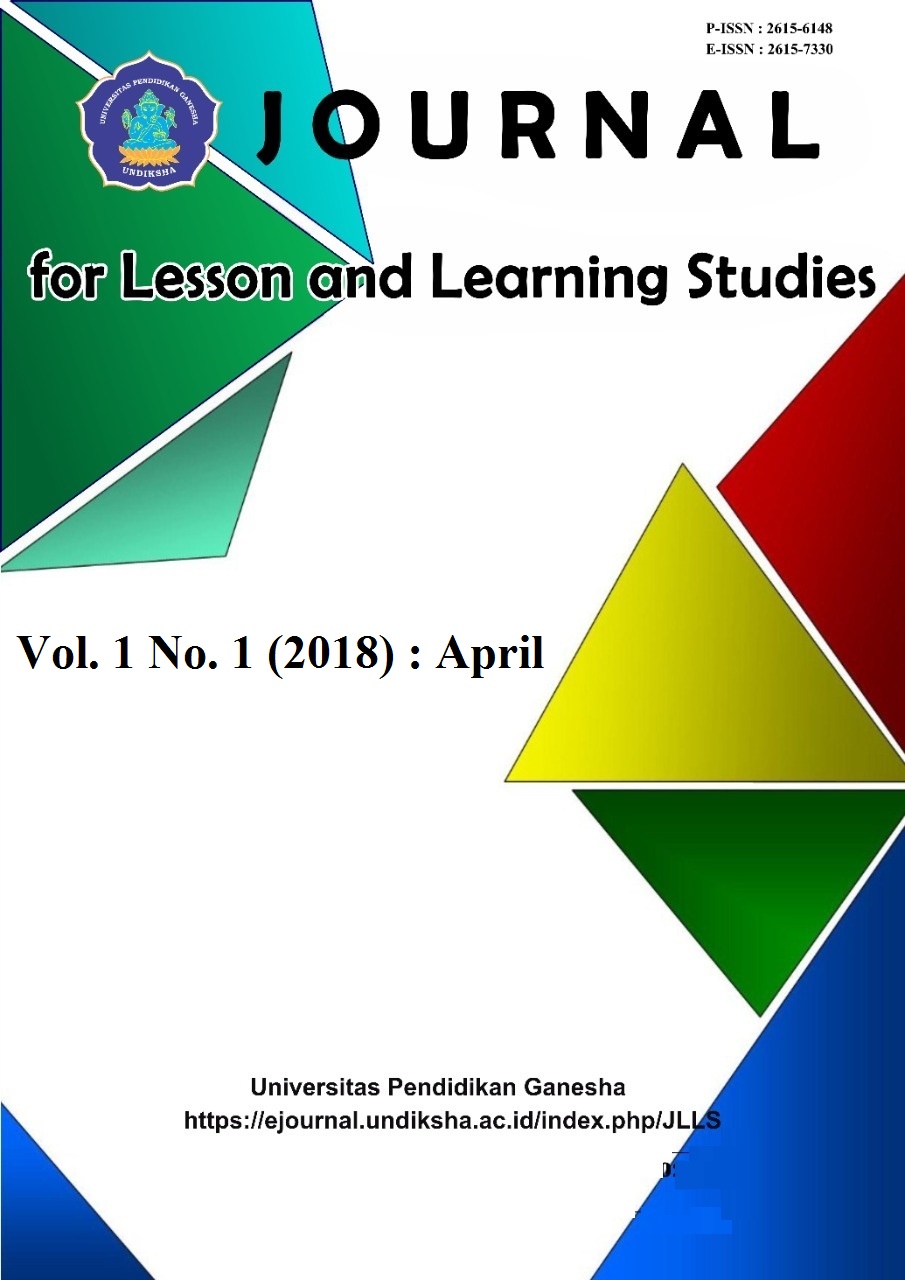KORELASI ANTARA KECERDASAN LINGUISTIK DENGAN KOMPETENSI PENGETAHUAN BAHASA INDONESIA SISWA KELAS V SD GUGUS I GUSTI NGURAH RAI DENPASAR BARAT TAHUN PELAJARAN 2017/2018
DOI:
https://doi.org/10.23887/jlls.v1i1.14624Abstract
The purpose of this research was to find out the correlation linguistic intelligence with Indonesia language knowledge competencies in Elementary School Gugus I Gusti Ngurah Rai Denpasar Barat Grade V academic period 2017/2018. The type of this research was ex post facto. Research populations were all students Grade V in Elementary School Gugus I Gusti Ngurah Rai Denpasar Barat academic period 2017/2018 which has population over 533 students. Sample was determined by proportional technique random sampling with the level of signification 5% and the number of sample gained from the populations were 218 students. The data retrieved from the recording of language knowledge competencies document Indonesia and linguistic intelligence from essays test by respondents. As the test persyarat is a test of normality distribution data. And the next is testing a hypothesis using correlation analysis product moment. Based on the analysis results we found that rxycount= 0.448. At a level of signification 5% with n = 218, obtained rxytable= 0.138. Because rxycount> rxytable = 0.448 > 0.138 it means that H0 that said there is no significant correlation between linguistic intelligence with Indonesia language knowledge competencies in Elementary School Gugus I Gusti Ngurah Rai Denpasar Barat Grade V academic period 2017/2018 was rejected and Ha was accepted. The conclusion was there is correlation between linguistic intelligence with Indonesia language knowledge competencies in Elementary School Gugus I Gusti Ngurah Rai Denpasar Barat Grade V academic period 2017/2018, with positive correlation line, which means the higher the linguistic intelligence will increase with Indonesia language knowledge competencies of students
References
Agung, Gede.2014. Metodelogi Penelitian Pendidikan. Malang: Aditya Media Publising.
Asril, Zainal. 2015. Micro Teaching. Jakarta: PT. Rajagrafindo Persada.
Hamalik, Oemar. 2005. Proses Belajar Mengajar. Jakarta: PT. Bumi Aksara.
Karter,dkk. 2014. “Hubungan Komunikasi Orang Tua dan Guru dengan Prestasi Belajar Siswa SDN Inpres 2 Lolu.” Jurnal media publikasi prodi PGSD. Volume 2, nomor 1. Tersedia pada http://download.portalgaruda.org/
(diakses tanggal 2 Januari 2018)
Mulyasa. 2002. Kurikulum Berbasis Kompetensi. Bandung: PT Remaja Rosdakarya.
Mulyasa. 2011. Menjadi Guru Profesional Menciptakan Pembelajaran Kreatif dan Menyenangkan. Bandung: PT Remaja Rosdakarya.
Susanto, Ahmad. 2013. Teori Belajar dan Pembelajaran di Sekolah Dasar. Jakarta: Prenadamedia Grup.
Umareani, Deshi. 2014. “Hubungan Antara Kecerdasan Lingustik dan Konsep Diri dengan Prestasi Belajar Bahasa Indonesia Siswa Kelas V Gugus Kompyang Sujana tahun pelajaran 2013/2014.” Jurnal Mimbar PGSD Universitas Pendidikan Ganesha, Vol 2, No. 1. Tersedia pada https://ejournal.undiksha.ac.id/index.php/JJPGSD/article/view/3073
(di akses tanggal 2 Januari 2018)
Downloads
Published
How to Cite
Issue
Section
License
Authors who publish with the Journal for Lesson and Learning Studies agree to the following terms:
- Authors retain copyright and grant the journal the right of first publication with the work simultaneously licensed under a Creative Commons Attribution License (CC BY-SA 4.0) that allows others to share the work with an acknowledgment of the work's authorship and initial publication in this journal.
- Authors are able to enter into separate, additional contractual arrangements for the non-exclusive distribution of the journal's published version of the work (e.g., post it to an institutional repository or publish it in a book), with an acknowledgment of its initial publication in this journal.
- Authors are permitted and encouraged to post their work online (e.g., in institutional repositories or on their website) prior to and during the submission process, as it can lead to productive exchanges, as well as earlier and greater citation of published work. (See The Effect of Open Access)




